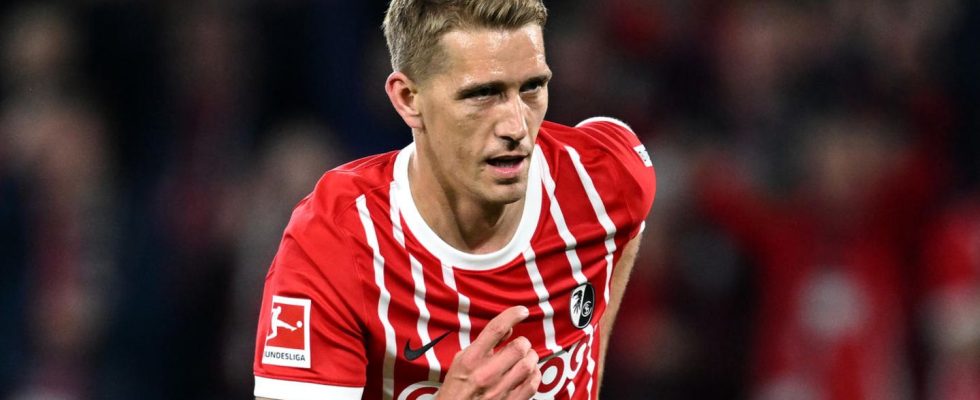football pro
It all started with a sleepless night: Nils Petersen went into therapy for 18 months while he was professional
Nils Petersen has ended his career
© Christian Kaspar-Bartke / Getty Images
Eloquent, down-to-earth, approachable: Nils Petersen was not only considered a cheerful fan favorite in Freiburg. Now the ex-national player talks about a dark phase in his life.
It all started with a sleepless night. Ironically, at the peak of his football career. Petersen stayed at the national team’s training camp in South Tyrol in 2018. Just before the World Cup in Russia. Joachim Löw had surprisingly called the striker into the provisional squad. Petersen didn’t close his eyes, as he reports in his book “Bankheimnis”, which will be published on July 24th. So he googles, diagnoses himself. “My head didn’t stand still anymore,” says Petersen.
Niels Petersen and his inner struggle
Petersen attributes the fact that he noticed so quickly that something was wrong with him to the feeling that a competitive athlete has for his body. From then on, Thursday became the most important day of his week. Thursday was therapy day. 18 months long.
“It’s an inner struggle. Of course, I would have preferred to break my arm and then know that it would be healed in a few weeks,” says the 34-year-old. “But nobody knows or can predict when it will stop. I had simply lost my zest for life.” Today he sleeps very well and says of himself that he is now “the new Nils”. At the beginning, his wife Carla wanted the old Nils back, “today she finds the new one much more balanced”.
Petersen does not consider himself cured and does not see something like that as absolutely possible. “Something like that never completely goes away. It’s like a scar that itches regularly,” says the two-time international. At best, however, one finds a way of dealing with it and knows what is necessary to regain one’s balance.
Mental health is a very private topic
Mental health is a very private topic. However, Petersen does not see it as a taboo – especially in the highly competitive football business worth millions. “Rather an open secret. When you articulate yourself, you first notice that other colleagues also suffer from similar problems or what kind of backpacks some people carry around with them,” says Petersen. You are not alone. “I suspect the number of unreported cases is actually quite high, both in football and in society. Everyone should find their own way there.”
It is understandably rare for professionals to talk openly about this. Timo Baumgartl is one of them. Psychological support has long been a matter of course for the defender, who was diagnosed with testicular cancer in May 2022. “Because I said to myself: The whole football system with the pressure and expectations – that can’t be healthy for a person,” said Baumgartl in the podcast “Feeling good”.
Mental health in competitive sports is getting more and more attention. Also because well-known athletes like Petersen, Baumgartl, Simone Biles, Naomi Osaka or Marcel Kittel went public with it and created an appropriate awareness. However, the step to get there is usually a big one. The fear of a stigma of being labeled as someone with a flaw in the pressure-ridden meritocracy is too great. Baumgartl therefore encourages everyone: “Everyone who goes to therapy can be proud of themselves.”

